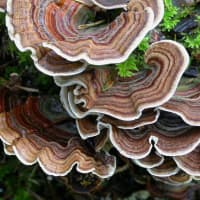Turkey Tail Mushroom (also known as Coriolus versicolor, Trametes versicolor, or Polyporus versicolor)[1]
Composition
Beta-Glucans (β-glucans)
Turkey Tail Mushrooms contain beta-glucans proven to suppress cancers, protect organs from toxicity, and provide immunomodulatory effects.[^2]
Krestin is a beta-glucan polysaccharide isolated from the turkey tail mushroom.
- Polysaccharide Krestin (PSK) is one of the most commonly used mushroom extracts.
Healing Properties
Anticancer (anti-tumor)
The anti-tumor effects of Krestin polysaccharide extract is most likely due to immunostimulatory effects.[^2]
- Krestin polysaccharide extract, a natural product commonly used for the treatment of cancer, is a specific TLR2 agonist and has potent anti-tumor effects via stimulation of both innate and adaptive immune pathways.[^2]
Breast Cancer
- Oral administration of Krestin polysaccharide extract significantly inhibits breast cancer growth.[^2]
Lung Cancer
Immunostimulatory
Krestin polysaccharide extract induces stimulation of both innate and adaptive immune pathways.[^2]
Chemoimmunotherapy
Chemoimmunotherapy is chemotherapy combined with immunotherapy. Polysaccharide-K, also known as krestin, has been used alongside chemotherapy for the treatment of cancer in Asia for over 30 years.[^3]
Immunomodulation
Disease / Symptom Treatment
Title: Anticancer and other therapeutic relevance of mushroom polysaccharides: A holistic appraisal
Author(s): Damini Kothari, Seema Patel, Soo-Ki Kim
Institution(s): Department of Animal Science and Technology, Konkuk University, 120 Neungdong-ro, Gwangjin-gu, Seoul, 05029, Republic of Korea, Bioinformatics and Medical Informatics Research Center, San Diego State University, San Diego, 92182, USA
Publication: Biomedicine & Pharmacotherapy
Date: September 2018
Abstract: The discovery of nutritious dietary supplements and side effect-free therapeutics are a priority in the current scenario of increasing instances of metabolic syndromes. In this direction, mushroom polysaccharides have shown immense promise. Scores of studies have characterized and evaluated their biological relevance, which range from antioxidant, Antiinflammatory, anticancer, antidiabetic, antimicrobial, and antilipemic to immunomodulatory. Hence, it is important to accumulate the key findings of these investigations, and to apply the insights to develop functional foods, and immunomodulators. This review attempts to meet this goal by gleaning the key discoveries on mushroom polysaccharides in the recent years, and to present them in a comprehensive manner. With this objective, the physiological relevance of the polysaccharides, the underlying mechanism, and hurdles in the path of their therapeutics transition, have been discussed. Finally, critical comments have been made to expedite research in this area.
Link: https://doi.org/10.1016/j.biopha.2018.05.138
Citations: ↩︎
